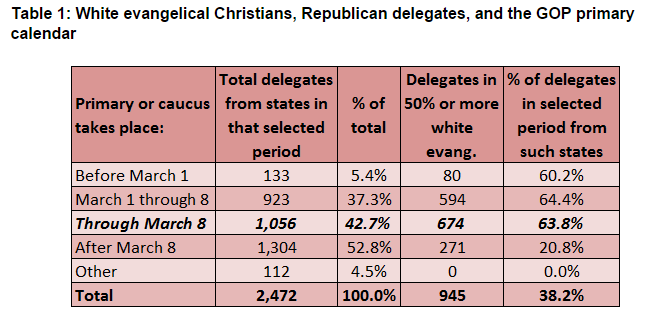Get ready for the culture wars to roar back during the presidential primary elections. As a broad field of GOP candidates tries to break out of the pack and give themselves a legitimate shot at the nomination they are going to be targeting the early primary states. What they’ll find is a primary electorate with a disproportionately high percentage of evangelical Christian voters.
Evangelicals “dominate” many of the states that hold primaries on or before March 8, according to an analysis by Geoffrey Skelley of the University of Virginia’s Center for Politics. By the time the early votes have been counted, 1,056 delegates will have been awarded, which equals 42.7 percent of the total available to candidates in the primaries.
Related: Fact Checkers Working Overtime – Top Whoppers from the GOP Debate
In the early states, 63.8 percent of those delegates will come from states that, according to Skelley, “could have electorates with majorities of white born-again Christian voters, who are generally more conservative than other Republicans and less inclined to support establishment-oriented candidates.”
That means two things. As has been widely documented, the early states can provide a slightly distorted view of the overall GOP electorate’s preference, as they have a stronger preference for strict conservatives than the national electorate. It also means that candidates looking to make an early splash, and perhaps create some momentum that has so far been lacking, will want to motivate evangelical voters to go to the polls. University of Virginia Center for Politics
It’s no mistake that candidates with strong ties to the religious right are campaigning hard in states like Iowa. Right wing culture warriors Rick Santorum, the former Pennsylvania senator, and former Arkansas governor Mike Huckabee won Iowa’s caucus in 2012 and 2008, respectively. Both are hoping for a repeat performance there in 2016, and this time around are joined by other candidates whose overt religiosity is a key element of their campaigns. Louisiana Gov. Bobby Jindal, for example, is completing the pilgrimage-like ritual of visiting all 99 Iowa counties before the caucus, as are retired neurosurgeon Ben Carson and Texas Sen. Ted Cruz.
“Carson and Cruz, having more resources and support in the polls than the other Iowa-focused conservatives, are already looking ahead to later contests in other white evangelical-heavy states,” Skelley says. “Recent national and state polls that have evangelical crosstabs show Carson leading among born-again voters.”
Related: How Trump, Carson, and Cruz Turned Republican Voters Against the GOP
As the early primaries draw near, voters should expect to see the traditional battlefields of the culture wars come back into play. Abortion rights, gay marriage and the provisions of the Affordable Care Act that mandate access to contraception will all be dragged back into the headlines by candidates with their eyes on evangelical voters.
However, what plays in Ottumwa in January and February won’t go over as well in New York in April or California in June. (True, a Republican nominee is unlikely to win either of those states in November, but their combined 267 delegates count just the same as conservative South Carolina’s at the GOP convention in July.) As Skelley’s analysis shows, the percentage of delegates from states with an electorate likely to be made up of more than 50 percent white evangelicals plummets to 20.8 for the remainder of the elections.
That means that, while evangelicals across the country are likely to hear politicians singing their tune in the next few months, the culture war motif of the campaign will likely fade somewhat among candidates who remain in the spring and early summer.






